- Home
- Rudy Rucker
Spaceland Page 16
Spaceland Read online
Page 16
I walked to the 7-Eleven, only two blocks from my new digs. I could have walked five blocks to the Los Perros Coffee Roasting, but I personally didn’t care all that much about what kind of coffee I had in the morning. That was more Jena’s thing.
I had to be careful to walk in what seemed like the wrong direction, and I almost got run over when I crossed the street. I picked up some coffee, a muffin and a mirror-reversed newspaper that was too much trouble to look at just now. I wasn’t sure whether I should pay with one of my new regular-looking hundreds or with some of the older mirror-reversed money in my wallet. So I hung back and watched another customer. Mirror-money was the way to go. I was glad I could still speak and listen.
Outside I took a bite of my muffin, and found myself reflexively spitting it onto the sidewalk. It tasted like soap, or worse, like the smell of Pine-Sol floor cleaner in an airport men’s room. I tried to wash away the janitorial taste with a sip of coffee, but the coffee was nasty too, a brew of nose drops and coconut sunblock, even worse than 7-Eleven coffee usually is. Something told me there was no use going back into the store to complain.
When I got home, I drank a couple of glasses of water, but even that didn’t taste quite right. The water had a faint hint of gasoline in it. I tried nibbling at some mints I had; they tasted like hot chili peppers. At this rate I would starve to death. Where the hell was Momo when I needed her? Again I peered out into Dronia, again I was scared to try going there.
I sat down in at my desk to study the paper, the . Right on the front page was a picture of the Los Perros Wells Fargo with an inset image showing some fanned-out hundred dollar bills. The bills in the picture didn’t look reversed to me, but by now I was realizing that I was the only guy who was out of step. If something looked right to me, it looked backwards to everyone else. I took the paper into the bathroom and held it up in front of the mirror so I could read it.
“Mirror Million Blows in Wind,” is what it said. “Bankers Check Coffers.”
Just then there was a knock on the front door. I lowered the paper and examined my face in the mirror. I looked kind of crooked, but not all that different. I went to the door.
“Hi Joe,” said Tulip, not really looking at me. She had her six gold earrings on, but she wasn’t wearing any makeup at all this morning. The old acne scars on her cheeks stood out very clearly. I finally grasped that this woman was a science geek. An engineer. “I brought some things,” she said, setting down two boxes of tools. She trotted back to her car for more stuff. A brown Nissan wagon. I noticed there was a statue of the Virgin Mary on her dashboard.
Tulip returned with two new cell phones, still in their boxes. “I’ll put a couple of your antenna crystals into these, and we’ll see what’s what.” She glanced at my face and did a double-take. “Is something wrong, Joe? Didn’t you sleep? Are you worried about Jena?”
“I just feel weird today,” I said. I longed to confide in her, but it didn’t seem safe. “Is the kitchen counter all right for you to work on? You can sit on this new stool.”
“Okay,” said Tulip. The bags under her eyes were darker than ever. “I didn’t sleep so well myself. I even tried to phone Spazz, but he wasn’t home. It sucks to be rejected.” That long black lock of hair was hanging down across one of her cheeks.
I brought Tulip some of my antenna crystals and she settled in with the cell phones and her tools. She had special thick glasses she put on for the close-up work. Her mouth was calm and serious. How wonderfully competent she seemed.
I dialed up my email on my desk computer, just to seem busy, but it was too hard to read the backwards writing. So then I hand wrote some notes towards a business plan for Mophone, Inc. Time passed. Tulip was quietly tinkering in the kitchen. I went in and looked at her, enjoying the curve of her back and the shine of her cheeks. She gave me a blank, preoccupied glance. I took a glass of gasoline-flavored water and went back to my desk. I was getting really hungry. Much as I hate thinking about science, it was time to figure out what had happened to me.
Momo had said it helped to think in terms of Flatland. I found some scissors in my desk and I cut out a little paper profile of a man, a man with feet and a body and a mouth and nose, with the feet and mouth and nose all pointing to the right. I set the flat man down on my desk and looked at him for a minute. I drew a dot in the middle of his head to stand for his third eye. And then I flipped him over so his third eye was pointing down into the desk. His feet and mouth and nose were all pointing to the left. Flipping the flat man over in the third dimension made him into his mirror image. That’s what had happened to me. I’d started out with my third eye pointing towards Klupdom, but then I’d turned it towards Dronia. And thanks to Wackle, I’d come back into Spaceland without reorienting myself.
“Playing with paper dolls, Joe?” asked Tulip. “You’ll make a perfect CEO.”
“I’m doing some out-of-the-box thinking,” I said, sliding the cut-out man into my desk drawer. “Previsualizing our users. Are you making any progress?”
“Well, your antenna crystals do have some functionality,” said Tulip. “If I pass current in through one wire it comes out through the other. Even though the wires don’t seem to touch each other. It’s like there’s an invisible loop. So maybe they really are antennas. Before I can test them, I’ll need to dash out to Fry’s. I need a couple of wiggywaggy-frammistat-bilgebulge-777-converters.” That’s not the exact phrase she used, but I’m no techie.
“Fine,” I said. “Get yourself a snack while you’re at it. I don’t have any food here.”
“Do you want to come along for the ride?” said Tulip. This was the closest thing to a friendly overture she’d made. But I needed some rime alone just now.
“I’m kind of busy,” I said.
“With your paper dolls,” said Tulip, laughing and shaking her earrings. “Rrright! Okay, Joe, see you later.”
As soon as she was gone, I went back into my bedroom, closed the door and the shades, and peeled myself into Dronia. No sign of Wackle. With a quick flip of my augmented body, I turned myself. over so that my third eye was pointing back towards Spaceland. And then I touched down.
Nothing was backwards anymore. My bed was on the proper side of the room, I could read the titles of my business books, and my face looked normal again in the mirror. Time to cat! I jumped in my car and jammed down to our local fast-food strip to stuff my gut. The food tasted great but when I got home I still felt a little wobbly, Grolly—I needed grolly for my augmented bod. I peered up into Klupdom. No sign of Momo anywhere nearby, but I did see a saucer with one of the Empress’s crimson-dressed soldiers. There was no hope of me trying to go vout there and forage for grolly just now. I’d have to wait for Momo and beg her. Where was she, anyway?
Around then Tulip came back. “Feeling better, Joe? You look more like your old self.”
“Yeah, I’m good now. I got some lunch. How was Fry’s?”
“It’s the key sight to see in Silicon Valley,” said Tulip. “Even though it’s rather ordinary. I always take my visitors there. You’ll find almost anyone in Fry’s. Last month I saw Clement Treed buying four PowerBooks. The maximum dot-commer. He’s tall and thin. He looks like a Muppet. A big mouth on a little head. He’s not that old of a guy either.”
“The MeYou Clement Treed? The richest guy in Silicon Valley? Did you talk to him?”
“I went, ‘Hi,’ and Treed went, ‘I’m sorry, but I’m busy right now.’ I was with my cousin Amita who’s just come over from India to take Computer Science classes at San Jose State. So then I put on my Indian accent and I said very loudly to Amita, ‘This is the pandit who defiles our Mahatma. He compares himself to Gandhi for material gain. For shame, Mr. Treed, for shame!’”
Tulip was referring to an ongoing MeYou ad campaign that had shown a picture of Gandhi and Clement Treed with the MeYou logo and web address. The ad was one of a series. They’d used Gandhi, Picasso, John Lennon, and Einstein, all blue-chip personalities like th
at, each of them Photoshopped in with Clement Treed. It was kind of gross, but the numbers showed the campaign was helping. As if MeYou needed to get any bigger. I’d read about the campaign in the business magazines. Instead of laughing along with Tulip, I drifted off for a second there, scheming about the Mophone. Maybe we could get some venture capital from Clement Treed. Even if Tulip had insulted him, he’d remember her. And that was half the battle.
“Are you even listening to me?” snapped Tulip. Her eyes were big and shiny, the pupils dark brown in the white orbs. “You keep it up, and I’ll charge you double tomorrow.”
“You’re not going to finish today?”
“Money, that always gets their attention,” said Tulip. “The pointy-headed bosses of the world. Come talk to me while I work, Joe, I’m getting bored.” Another overture. Not riding to Fry’s with her had been a good move. It had made me more of a challenge. Women like a challenge.
So now I sat on the other stool in the kitchen, chatting with Tulip. She’d pried the two cell phone cases open, and she was replacing the old antenna assemblies with my antenna crystals and those whizzbang-whatever chips from Fry’s. She had her thick glasses on and she was using a soldering iron.
“I’m going to start out with a peer-to-peer architecture,” said Tulip. “Like walkie-talkies.”
“Are walkie-talkies different from cell phones?”
“Cell phones use the client/server architecture. If you call me on a normal cell phone, your phone sends a signal to a telephone company’s antenna, the telco does some digital munging on the signal, and then a telco antenna broadcasts the signal back out for me to pick up. We’re clients and the telco is the server. Walkie-talkies send signals directly to each other without any third party. Peer-to-peer instead of client/server. Peer-to-peer is only practical for short distances. But if this so-called ‘superchannel’ of yours works as well as you say it will—maybe we can stretch it out. In terms of hardware it also happens to be easier to implement. And since I don’t think it’s going to work anyway—”
“You’re saying the Mophone could work without a phone company to back it up?” I said, getting excited. “The users wouldn’t have to pay a monthly service charge?”
“Would be nice, huh?” Tulip crimped in the corners of her mouth and gave me a serious look. “What’s the story with the superchannel, Joe? And where did you get the crystals?”
“I guess I can tell you new,” I said. “A creature from the fourth dimension gave them to me. Her name is Momo. The wires in the middle don’t actually disappear; they stick into the fourth dimension. They make a loop on the vinn side of our space.”
“So you’re going to be like that, huh?” said Tulip, leaning over the phones. She totally thought I was kidding. A little blue plume of smoke spiraled up from her soldering gun. “Never mind. Did you hear anything from Jena today?”
“No. I guess she went in to work.”
“I don’t think so,” said Tulip, brushing aside a hanging twist of hair. “I cruised by 1234 Silva View Crescent on my way back from Fry’s.” She rolled her big eyes my way, regarding me over the lenses of her glasses. “Jena’s Beetle and Spazz’s motorcycle were both there. I guess they’re having a honeymoon.”
“They missed work?” I exclaimed. “I wonder if something’s wrong with them.”
“Why do you say that?” asked Tulip. “You didn’t sneak over there and kill them, did you, Joe? The house looked awfully quiet.” There was a slight smile on her full, chocolate lips, but she wasn’t completely joking. She was a little afraid. She wasn’t quite sure what I was like. She had this skittish, almost paranoid side to her.
“I’m not a violent guy, Tulip.”
“Last night you said you wanted to kill Spazz.”
“And you said you wanted to wring Jena’s neck. We were venting. Commiserating. Look, I am so over Jena, you wouldn’t believe it. I’ve wasted too many years looking to her for my self-esteem. I’m okay. I know that now. I’m okay just as I am. Do you have good self-esteem, Tulip?”
“Of course,” said Tulip. “But that’s not the right way to think. I’m more concerned about my relationship to God.”
This was kind of jarring. I hadn’t heard a single person talk seriously about religion in the whole time I’d been in California. Not like back in Matthewsboro—I remember one time there I’d picked up a hitchhiker from the local Bible school, and as soon as he’d gotten in my car, he’d said, “Have you heard about Jesus?” Just to be a wise guy, I gave Tulip the same mock-innocent answer I’d given the hitchhiker.
“Who?”
“I told you I’m religious, Joe. It’s the center of my life. God is the living core of everything around us. We’re the clients and God’s the Server. He has an inordinate fondness for people as well as beetles.” She laughed easily. “Yes, I’m different from most people. I care about God and about my fellow humans. I hope you don’t have a problem with that, Mr. Self-Esteem.”
“I totally respect your opinions,” I told Tulip. “But I do have a little trouble seeing how you fit in with Spazz.”
Tulip was quiet for a minute, thinking. “Spazz’s attraction for me? You know how we met? We were both buying earrings at an Indian store. Spazz makes me laugh. And—well, I’ve always been a very good girl, you know. Spazz represents, oh, chaos, disorder, creativity, bohemianism. He excites me. I guess I had some hope of reforming him a little bit. But it didn’t work.”
“Spazz—he’s not religious at all,” I said. “He’s a stoner.”
“Well, Spazz claims getting high is a way to see God,” said Tulip. “But enlightenment isn’t about getting high. It’s about compassion.” She’d been working all this time. Now she set down her tools, took off her glasses, and got up from her stool. She gave me a full, frank look. Her dark mouth was level and serious. There were shiny highlights from the window on her large, thoughtful eyes. I’d stopped noticing the scars on her cheeks. I wished I were more bohemian. “Here,” said Tulip, handing me one of the cell phones. It looked the same as ever, but she’d put the antenna crystal inside it. “Take this outside and try to call me.”
“You’re done?”
“For now. The way it works is that when you press the Send button on either of these phones it makes the other one ring.”
I went out into the backyard and pressed the Send button on the Mophone. I heard a ringing from inside the house, and then, over the phone, a click and silence. Tulip had answered my call.
“Mr. Watson, come here,” I said. “I want you.”
“Mr. Bell,” came back Tulip’s voice, crystal clear. “I heard every word you said—distinctly!” We’d both seen that old movie about the invention of the telephone.
“Terrific!” I cried. “I wonder what kind of distance we can get? Should be pretty much unlimited. There’s nothing to get in the way in hyperspace. No buildings, no curvature of the Earth.”
“Hyperspace,” said Tulip’s voice in the Mophone. She was ready to take me seriously. “You really say a creature from hyperspace gave the antenna crystals to you?”
“Momo,” I said.
“Did she ask you to worship her?” Tulip stepped out onto the porch to look at me. The bags under her eyes were dark and tired. “Did she ask for your soul?” I remembered Tulip’s mentioning that she watched a lot of supernatural horror movies. She seemed like one of those people for whom a fear of the devil was the downside of their love for God. My mother had been like that; in fact she’d thought about the devil a whole lot more than she’d thought about God. I’d never seen the point. Believe in a loving God, fine, but why scare yourself with stories about Satan? It’s not like you need Satan to account for evil. Ordinary people pump out plenty of it on their own.
“It wasn’t like that at all,” I told Tulip, turning off the Mophone and looking at her. “There’s nothing supernatural here. This is science and business. Momo’s basically a plantation owner from the fourth dimension. Like a saucer alien or somethin
g. Her family grows this stuff called grolly.”
Tulip shook her head. The idea of Momo seemed to upset her. “I think I’ve done enough for one day,” she said. “Four thousand dollars worth. I’m going home.”
“Will you come back tomorrow?”
“Maybe.” She fingered one of the dark humps on her cheek. “Will you cut me in for stock?”
“Sure I will! You can really take another day off from work?”
“Yeah,” said Tulip. We walked back into the house and sat on the stools in the kitchen. “I phoned ExaChip while I was at Fry’s,” she explained. “They’re not doing jack this week. I told my boss I’m going skiing, and he said it was fine.” She hefted her Mophone. Her mood was brightening again. “I’m starting to believe in the antenna crystals. The fourth dimension. I guess anything’s possible. The Mophone could be a killer product. How much stock would you offer me?”
“You can be the Chief Technology Officer,” I said. “I’ll give you, I don’t know, a tenth of our founder’s stock? But then I’d only want to pay you like five hundred dollars a day.”
“I’m getting two hundred thousand a year at ExaChip,” said Tulip. “So you’d have to go at least a thousand a day.”
“I could do that,” I said, maybe too quickly. I really wanted Tulip in on this. She was smart, I was attracted to her, and—if I could win her over, it would be a way to get back at Spazz. Show him I was as much of a man as he was. “I could give you my extra room, too. If you need a place to live.”
“Let’s take a look at it.”
We walked through the tiny hall to the unused bedroom. Tulip gave the room the once over and peered out the windows. She turned her big eyes on me and brushed back her loose-hanging hair. “It would be handy, for a while. But I wouldn’t want you to have any unrealistic notions.”

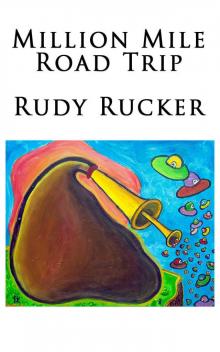 Million Mile Road Trip
Million Mile Road Trip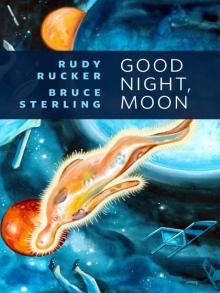 Good Night, Moon
Good Night, Moon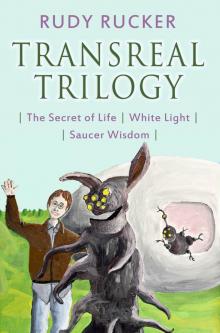 Transreal Trilogy: Secret of Life, White Light, Saucer Wisdom
Transreal Trilogy: Secret of Life, White Light, Saucer Wisdom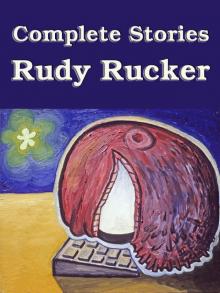 Complete Stories
Complete Stories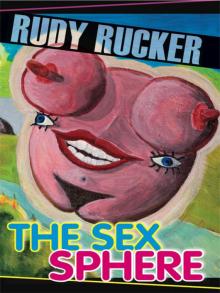 The Sex Sphere
The Sex Sphere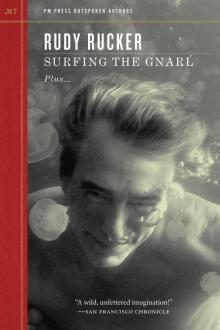 Surfing the Gnarl
Surfing the Gnarl Software
Software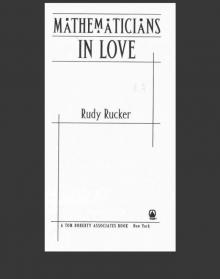 Mathematicians in Love
Mathematicians in Love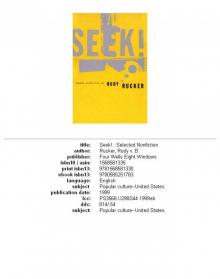 Seek!: Selected Nonfiction
Seek!: Selected Nonfiction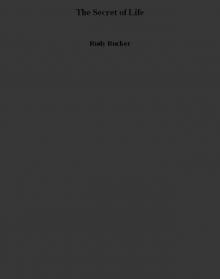 The Secret of Life
The Secret of Life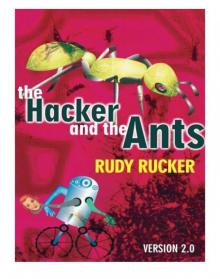 The Hacker and the Ants
The Hacker and the Ants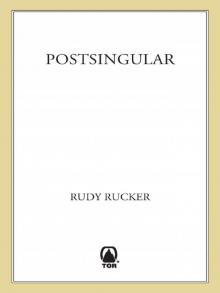 Postsingular
Postsingular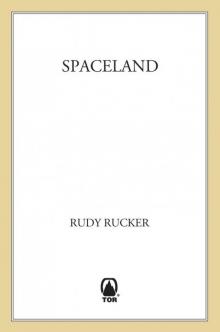 Spaceland
Spaceland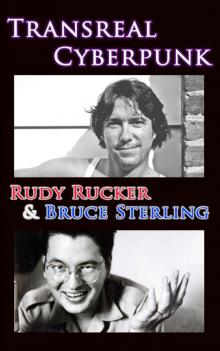 Transreal Cyberpunk
Transreal Cyberpunk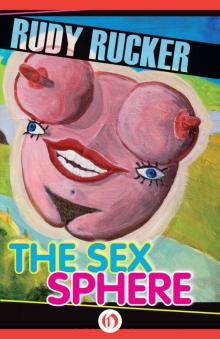 Sex Sphere
Sex Sphere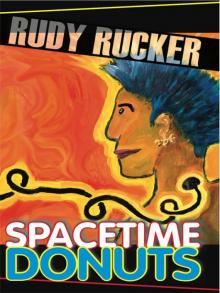 Spacetime Donuts
Spacetime Donuts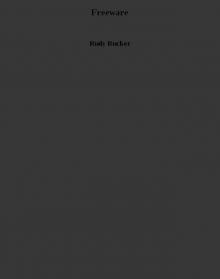 Freeware
Freeware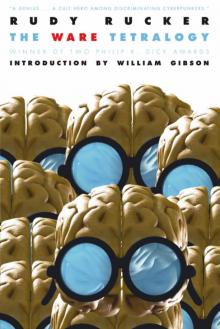 The Ware Tetralogy
The Ware Tetralogy Frek and the Elixir
Frek and the Elixir Junk DNA
Junk DNA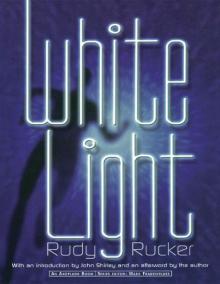 White Light (Axoplasm Books)
White Light (Axoplasm Books)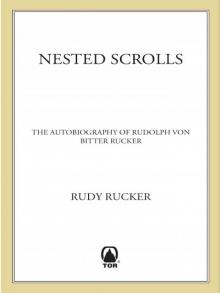 Nested Scrolls
Nested Scrolls Inside Out
Inside Out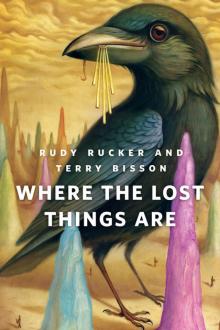 Where the Lost Things Are
Where the Lost Things Are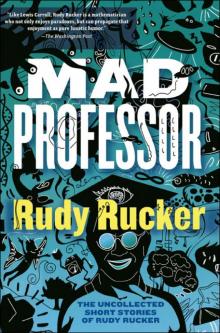 Mad Professor
Mad Professor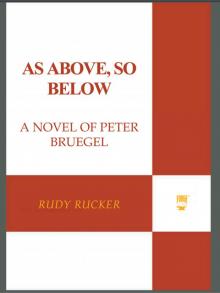 As Above, So Below
As Above, So Below Realware
Realware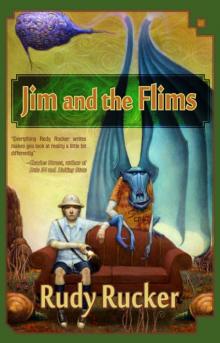 Jim and the Flims
Jim and the Flims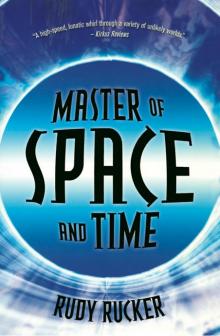 Master of Space and Time
Master of Space and Time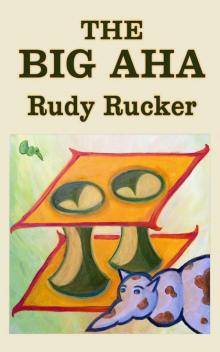 The Big Aha
The Big Aha Hylozoic
Hylozoic